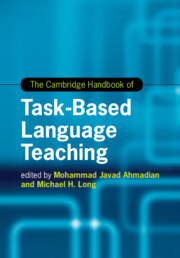Book contents
- The Cambridge Handbook of Task-Based Language Teaching
- Cambridge Handbooks In Language And Linguistics
- The Cambridge Handbook of Task-Based Language Teaching
- Copyright page
- Dedication
- Contents
- Figures
- Tables
- Contributors
- Preface The Origins and Growth of Task-Based Language Teaching
- Part I The Rationale for Task-Based Language Teaching
- Part II Tasks and Needs Analysis
- Part III The Task Syllabus and Materials
- Part IV Methodology and Pedagogy
- 9 A Psycholinguistically Motivated Methodology for Task-Based Language Teaching
- 10 Technology-Mediated Task-Based Language Teaching
- 10A Delivering Task-Based Language Teaching at Scale
- 10B Task-Based Language Teaching and Indigenous Language Revitalisation
- 10C Task-Based Simulations for Diplomatic Security Agents
- Part V Task-Based Language Teaching with School-Age Children
- Part VI The Teacher in Task-Based Language Teaching
- Part VII Task-Based Assessment and Program Evaluation
- Part VIII Research Needs and Future Prospects
- Index
- References
10 - Technology-Mediated Task-Based Language Teaching
from Part IV - Methodology and Pedagogy
Published online by Cambridge University Press: 19 November 2021
- The Cambridge Handbook of Task-Based Language Teaching
- Cambridge Handbooks In Language And Linguistics
- The Cambridge Handbook of Task-Based Language Teaching
- Copyright page
- Dedication
- Contents
- Figures
- Tables
- Contributors
- Preface The Origins and Growth of Task-Based Language Teaching
- Part I The Rationale for Task-Based Language Teaching
- Part II Tasks and Needs Analysis
- Part III The Task Syllabus and Materials
- Part IV Methodology and Pedagogy
- 9 A Psycholinguistically Motivated Methodology for Task-Based Language Teaching
- 10 Technology-Mediated Task-Based Language Teaching
- 10A Delivering Task-Based Language Teaching at Scale
- 10B Task-Based Language Teaching and Indigenous Language Revitalisation
- 10C Task-Based Simulations for Diplomatic Security Agents
- Part V Task-Based Language Teaching with School-Age Children
- Part VI The Teacher in Task-Based Language Teaching
- Part VII Task-Based Assessment and Program Evaluation
- Part VIII Research Needs and Future Prospects
- Index
- References
Summary
Technology has been increasingly incorporated into the second language learning classroom and curriculum, highlighting the need for researchers and educators to consider how it has affected the tasks they facilitate, as well as their mediating effects on second language learning and teaching. This chapter explores how the unique advantages of various forms of technology can enhance and support the developmental and performance-related benefits of TBLT. We propose that technologies that follow a ‘learning by doing’ philosophy, facilitate learner involvement in everyday tasks, and provide spaces to engage with the language and other speakers are ideal tools to enact TBLT in ways that are not possible in traditional language classrooms. Examples of such tools and tasks are presented together with research that supports their effectiveness for language learning. The chapter ends with a look into the future of technology-mediated tasks, including some challenges that need to be resolved for the advancement of technology-mediated TBLT.
Keywords
- Type
- Chapter
- Information
- The Cambridge Handbook of Task-Based Language Teaching , pp. 326 - 345Publisher: Cambridge University PressPrint publication year: 2021

